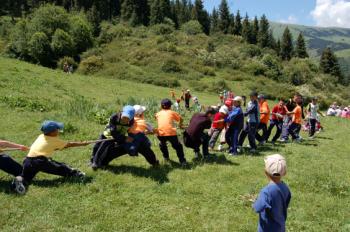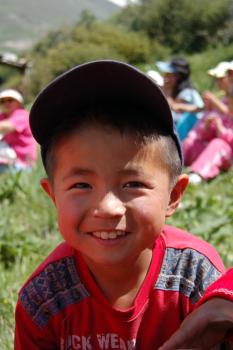Many children cannot live with their families

Cholpon-Ata is a small town on the northern shore of Lake Issyk Kul in the northern Tien Shan Mountains. The lake is the world’s second largest at such a high altitude and is an important economic and biological treasure of the area.
The region is mostly rural, with most of the people living off agriculture. The area’s natural beauty – not only the lake but also the surrounding mountains – have traditionally attracted tourists to the area. The town of Cholpon-Ata continues to be a popular holiday resort, but the number of visitors has fallen recently.
The area’s remote location, underdeveloped infrastructure and the general political instability in the country has made it difficult for the local population to improve their standard of living. Environmental problems further threaten the livelihood of many who depend on farming for a living.
In spite of the fact that the number of vulnerable families is rising, there are not enough specialists who can provide these families with the support they need in order to stay together.
As a result there has been a growth in the number of children losing parental care. Children who are at risk include those who have many siblings, those who have disabilities and those whose parents are ill. Young mothers, especially if they are unmarried, are often rejected by their families and struggle to provide for their family.
SOS Children's Villages received official support to start working in the area
What we do in Cholpon-Ata

SOS Children's Villages provides different kinds of assistance to the local population. Working with local authorities, the family strengthening programme gives support to vulnerable families. We aim to ensure that children receive material aid (food and clothes) and have access to essential educational, and health services.
We also provide parents with counselling and psychological support, with advice on parenting skills and help them generate income. For example, with our support families have started farming, breeding rabbits or have opened a catering business. Given the increasing rates of HIV/AIDS in the country, we run projects to support people affected by the disease and prevent children from becoming infected.
Children who have lost parental care can find a loving home in one of the twelve SOS families, where up to 78 children can be looked after by the SOS mothers. They grow up with their sisters and brothers in a familial environment. They are fully integrated into the local community, attending school with children from the area.
When young people are ready to move out of their families they can join our SOS Youth Programmes. With the support of qualified professionals they are guided through this new stage of their lives, as they start vocational training courses, attend higher education and look for work.